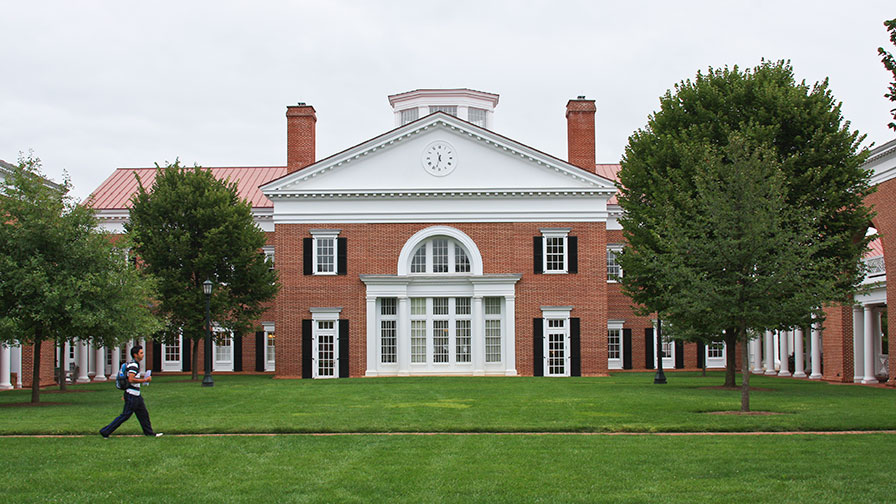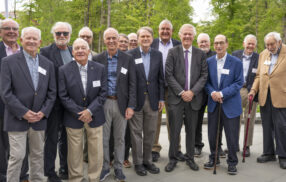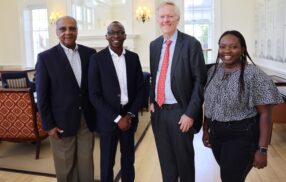
UVA Darden Forum in Shanghai Explores Global Opportunities for Family Businesses
By Julie Daum
More than half of the businesses earning $1 billion-plus in annual revenue in the emerging markets of Asia, the Middle East and Latin America are family-owned. As developing economies continue to gain global influence, so too will family businesses.
Against this backdrop, the University of Virginia Darden School of Business hosted the Family Business Going Global: Connecting Practice to Research forum on 7 May 2015 at the Pudong Institute of Finance in Shanghai, China. More than 80 participants, including business owners, wealth managers and scholars, packed the conference room overlooking Shanghaiís sky-high financial district.
“In Forbes’ 2015 list of the top 100 companies, 48 are from Europe and 27 are from the United States,” said Darden Professor Dennis Yang, academic director of Darden’s Asia Initiative, which sponsored the event. “Despite the prevalence of family business among Chinese societies, only two made the list, but none from the mainland China. Only 30 years have passed since China began reforms and privatization, and most family businesses are in the first generation.”
“To grow bigger and stronger, Chinese companies need a working heritage mechanism, and they need to extend their global influence,” said Yang.
Joseph Fan, co-author of the new book The Family Business Map and a professor at the Chinese University of Hong Kong, cautioned that the handover period of companies from one generation to the next is critical – and fragile.
“Research shows that 56 percent of market value is lost during the handover period,” said Fan. He listed multiple potential roadblocks: relationship and trust issues, capital and growth, and the disruptive capacity of technology, to name a few.
“Family businesses should be built on intangible assets – forces such as religion, values or a sense of responsibility – that keep the family together,” he said.
The forum also examined succession planning, and whether family businesses should be run by professional managers or by the next generation of family members.
Baocheng Yang (MBA ’04), whose parents founded the first private university in China, Huanghe Science and Technology College, now serves as its provost and chief operating officer. A member of Darden’s Global Advisory Council, he offered his personal story and recommended letting the second generation get involved in the family business as soon as possible so that they understand the culture and earn the employees’ trust.
Kathryn Feng, executive director of CEIBS Centre for Family Heritage, introduced three entrepreneurs who are taking their companies global.
Weiwei Feng, general manager of NHEST and executive director of CROCEA, joined her father-in-law’s company – which is a small-sized, labor-intensive manufacturing business – after returning to China from London.
“We need to think about how to sell our products overseas and to bring in international talent,” she said. “We feel proud of made in China, but that was the first phase. I am focused on the second phase, which is quality in China.”
Entrepreneur Shaojie He, general manager of NHST and director of NESU, also returned to China after studying in Canada to work in his family company.
“We are investing in intelligent technology and the Internet of things. We’re using new technology to lead the transformation of traditional industry,” he said. “For example, we started with fishing and have introduced new sensors to the fishing industry, working with experts in Japan.”
Jerry Peng (MBA ’03) is the chair and chief executive officer of Tranlin Inc., the U.S. subsidiary of Shandong Tranlin Paper Company, and a member of the Darden School Foundation Board of Trustees. Tranlin applies world-leading proprietary technologies from China to produce tree-free and chlorine bleach-free paper tissue products, as well as humus-based organic fertilizer to serve consumers and farmers in the U.S. He shared the story of Tranlinís $2 billion investment to build a new factory in Virginia in the United States.
When taking a company global, Peng emphasized the importance of a spirit of partnership. “You must focus on trust building, bridging the gap and solving problems. I work to build trust on a daily basis with the American community, with the Chinese community and with investors.”
Darden Professor Frank Warnock introduced speakers who addressed the connection between academic research and practice.
Feng Xi, senior vice president of Horizon Research and Consultancy Group, recently published the book Index for Healthy Chinese Family Business. His research underscores the importance of both hard and soft competencies. “You need to transfer Chinese style into international style,” he said. “You need to get used to both Western and Chinese cuisines and digest both.”
An important challenge for Chinese family businesses is sustainability and the effects of the one-child policy. “What if the child doesn’t want to be involved in the business?” asked Feng Xi. “Many wealthy children go abroad and don’t necessarily want to go into the business. A second challenge is culture, bridging the gap between the generations and the different Chinese cultures.”
The Family Business Going Global forum was presented by Darden’s Asia Initiative, which provides a hub of global activities to bridge East and West, and to shape thinking and education regarding Asia and its relationship with the rest of the world.
The forum was supported by CEIBS Centre for Family Heritage, the Chinese University of Hong Kongís Institute of Economics and Finance, Horizon Institute of Global Development Power and Pudong Institute of Finance.
The University of Virginia Darden School of Business prepares responsible global leaders through unparalleled transformational learning experiences. Darden’s graduate degree programs (MBA, MSBA and Ph.D.) and Executive Education & Lifelong Learning programs offered by the Darden School Foundation set the stage for a lifetime of career advancement and impact. Darden’s top-ranked faculty, renowned for teaching excellence, inspires and shapes modern business leadership worldwide through research, thought leadership and business publishing. Darden has Grounds in Charlottesville, Virginia, and the Washington, D.C., area and a global community that includes 18,000 alumni in 90 countries. Darden was established in 1955 at the University of Virginia, a top public university founded by Thomas Jefferson in 1819 in Charlottesville, Virginia.
Press Contact
Molly Mitchell
Associate Director of Content Marketing and Social Media
Darden School of Business
University of Virginia
MitchellM@darden.virginia.edu





